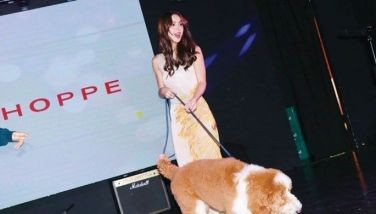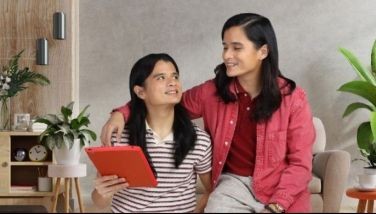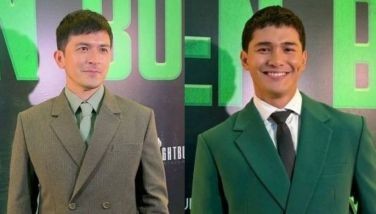‘Crocodile Hunter Jr.’ shows what’s Wild But True
MANILA, Philippines - Ask Robert Irwin what he wants to become when he grows up, and his answer isn’t really a surprise.
“Ever since I can remember, I’ve always wanted to be a wildlife warrior,” the precocious and highly articulate 10-year-old son of the late Australian wildlife expert, conservationist and TV star Steve Irwin (also known as the Crocodile Hunter, thanks to his then internationally broadcast show of the same title) told The STAR in an interview recently.
Robert, who was chaperoned by his mom Terri and sister Bindi, came to Manila to promote his own TV show called Wild But True on the Discovery Kids cable channel. It was such a treat talking to Robert, who has an impressive grasp of very grown-up concepts like conservation, to complement that infectious sense of awe and wonderment of a child.
In Wild But True, Robert makes his television debut alongside Isabel Yamazaki, and together they explore the wonders of bio-mimicry and how wildlife has inspired many modern-day inventions. The brand-new series airs Tuesdays at 5 p.m. and encores Saturdays at 9:30 a.m. and 1:30 p.m.
Robert said, “It’s so fun to be able to encourage so many kids to go outside and enjoy nature (through the show).”
According to his mom, Robert truly takes after his father. “He’s exactly the same. We showed Robert a picture of his dad when he was his age, about 10 or 12, and I said, guess who this is, and he said that’s me, and I go, nope. They look so much alike when they are kids.”
Terri added, “Not many people know that Steve was a real scientist. He published a number of papers, was extremely curious and intelligent, and I see that in Robert. Robert is very interested in pre-history, paleontology, and his dad and I, we filmed a documentary about dinosaurs that is now rather laughable. I think Steve was very fun on television, had a childlike enthusiasm and passion but not many people knew that behind the scenes, he was very intelligent and much a scientist. Robert is the same way, he’s very gung-ho and adventurous, he cannot sit still, but he is also very thoughtful.”
When he’s not filming, Robert said he’s doing regular kids stuff. But having a look at his interests and hobbies — “I’m obsessed with downhill mountain-biking, paleontology, photography,” he enthused — maybe not quite.
His idea of playtime is spending time with the animals. “We live in a zoo. Every time our friends come over, we never like sitting around or playing video games. We go and play with the giraffes, the little lemurs, we feed the rhinos, we have a very awesome life. I wouldn’t have it any other way.” The zoo he is referring to, of course, is the family-owned Australia Zoo, touted as one of the biggest wildlife conservation facilities in the world, located north of Brisbane, on Queensland’s Sunshine Coast.
Robert is also not a big fan of gadgets. “We’re not trying to say that you can’t use them. Sure you can. Devices are a great way to (learn) but try to choose them when you’re travelling (for long travel) but if you have the weekend off, I don’t think it’s a good idea to sit and play on your iPad.”
Robert (who is two years ahead in school; he’s already a seventh grader) added, “It’s really kind of scary, this is a real statistic that is just crazy — on average most children in the US, they spend (only) seven minutes outside every day. That’s walking to the bus stop! It’s crazy!”
Asked what else he wants to do, Robert replied that he wants to experience skydiving when he’s older like sister Bindi.
So, does Terri as a mom try to “moderate” young Robert’s interest in high-adrenalin activities? She said that it’s about making a calculated risk. She makes sure that Robert is the most protected kid around, complete with helmet, pads and all.
“Safety comes first (in our croc research or in our lives). You kind of let the kids fly and let them go but at the same time, you hope you have taught them enough to be careful,” she said. “I’m very proud of him, whether he’s doing conservation work, school, filming or even having fun. Robert is a mad, keen mountain biker, and he’s never been hurt in mountain-biking because he really applies himself to having fun but doing it well — I’m very proud of him.”
Here’s the rest of our conversation with Robert:
On his favorite memory of his father Steve (who sadly passed away in 2006 because of a stingray accident while shooting a documentary):
“My favorite memories of dad are our crocodile research trips. Every year, we go up to the Steve Irwin Wildlife Reserve, a massive nature reserve right at the northernmost point of Australia in Queensland. It’s just the most incredible place ever and that’s where we do our crocodile research every year, during the months of August and September, we head out there, and we catch crocodiles, we’ll trap them, pull them out of the tracks, and then jump on them so we actually have to restrain them and jump on the crocs.
“I think the first time I jumped on a croc I was only about two years old, and so it looks a bit crazy and weird but it’s the best thing for us and for the crocodiles because they don’t really handle sedatives very well, that’s why we jump on the crocs. And the research we’re doing is just phenomenal, not only can we see where the crocs go, using acoustic or satellite trackers, but we can also identify how long can they hold their breath — a crocodile can hold its breath for over seven hours — and what a crocodile can be feeding on.”
On what he knows about the Philippines so far:
“I’m definitely familiar with how incredible wildlife and wild places in the Philippines are. I’d definitely want to explore the Philippines so much more. We’ve stayed mostly in Manila. We hope to do some croc research here. The Philippine crocodiles, they are so, so endangered so I’ve always wanted to definitely see them a little more up close and personal. I was very honored last year, that I was able to hold a baby crocodile and it was amazing because there’s a few left in the world, and very rare to see, so that was a very amazing experience.
“I’d also like to see a Palawan bear cat in the wild, that would be awesome! We have them in the Australia Zoo, and so cute! Have you seen a Palawan bear cat before? They actually smell like pop corn, they’re really cute, and it’s kinda weird because you look at them, it’s kinda a mixture of a bear and a lemur and a cat…In Australia, we don’t really hold them, but you can get inside, feed them and pat them, take them out of their enclosures, and tour them around the zoo so that people can see them up close, because Australia Zoo is the most hands-on zoo in the world.”
On how big an influence his family is:
“I think I’ve got the best family in the world. I’m so lucky! They’ve supported me in everything I wanted to do, and I’ve always wanted to follow in their footsteps, and carry on my dad’s work as well in the Australian Zoo, and to be a wildlife warrior. The definition of wildlife warrior is one who stands up and speaks for those who cannot speak for themselves. I think my mom, my sister and my dad are definitely my main mentors. I just want to be like them. No, the pressure is not put on me — like you have to do this, this is my choice, I’ve always wanted to be exactly like my dad to be able to create positive change. I don’t have a sense of people putting pressure on me to do things.
“Ever since I can remember I’ve always wanted to be a wildlife warrior, and get my message to even more people, and hopefully millions of people worldwide through Wild But True. That’s awesome — to be able to get on TV and kind of build up a platform, then my message can spread to thousands of people and you know, one message I really want to say to kids, especially, is you don’t have to live in a zoo, you don’t have to be travelling around the world to make a difference, it doesn’t matter where you are, whether you are in the Outback of Australia, or if you’re here in Manila, wherever you are, you can create a difference and make a positive change. Even little things like turning off the tap when you’re brushing your teeth, or planting a tree, or even just turning off the light when leaving the room, you’re saving electricity. You don’t have to completely change your lifestyle, you can go to the park and maybe climb a tree (but not go past roof-height, mom Terri reminds), then you’re connecting with nature. You have to have some kind of connection with nature. Every single little thing that you do can make a difference.”
- Latest
- Trending



























